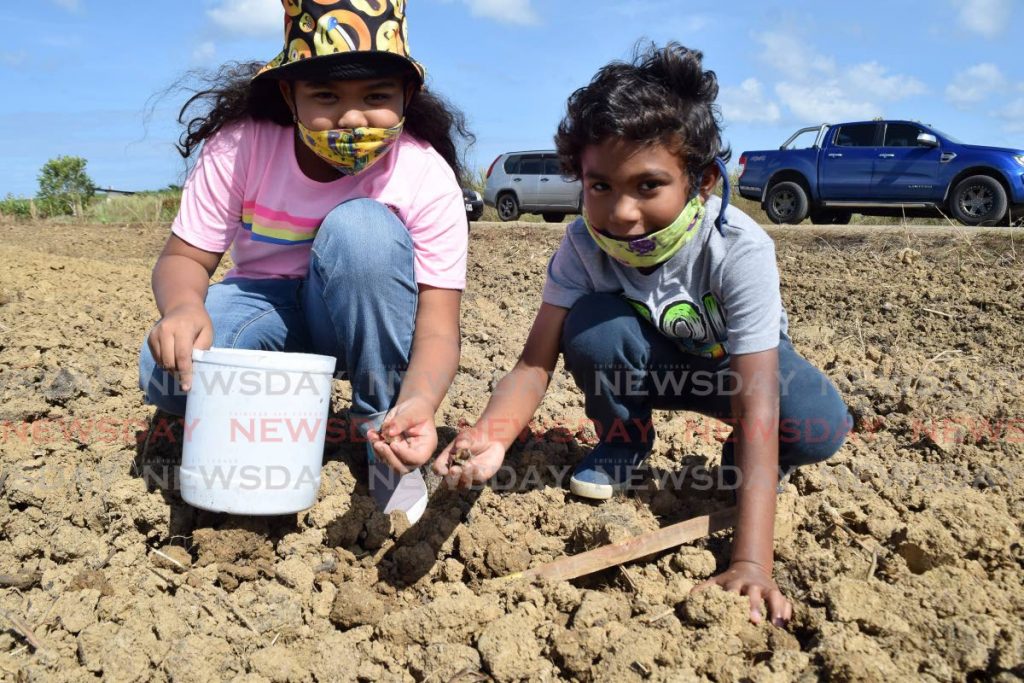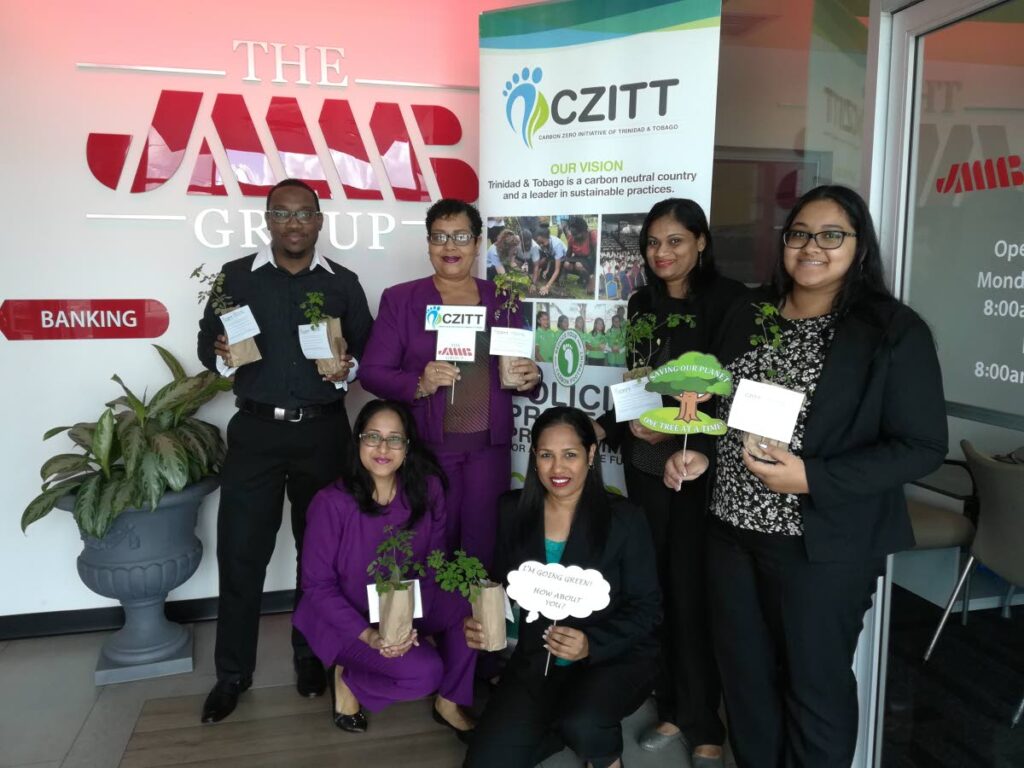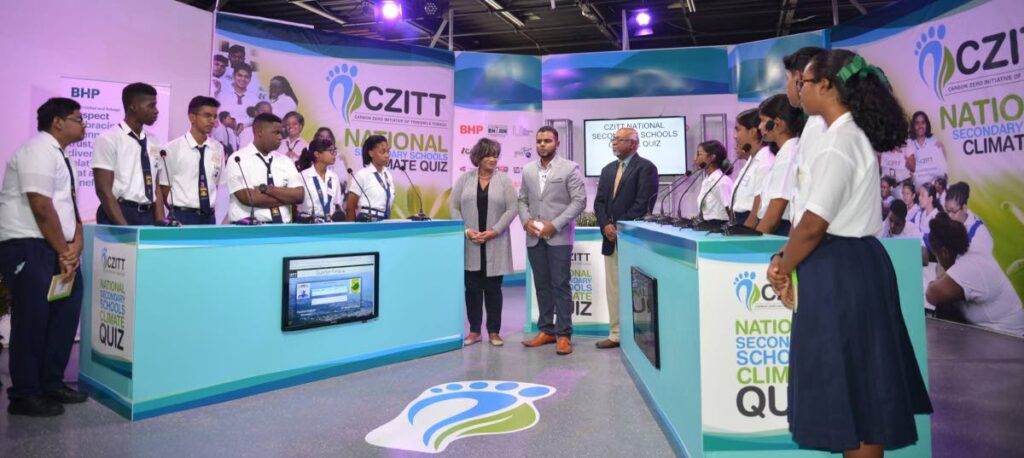Former Petrotrin chairman Donald Baldeosingh on a mission to reduce carbon emissions

Did you know you can contribute to the fight against climate change by doing something as simple as planting a moringa tree?
Throughout its lifetime, one moringa tree can remove at least 80 kilogrammes of carbon dioxide from the atmosphere per year as moringa trees absorb more than 20 times the amount of carbon dioxide other trees absorb.
So when some people think about how they can adopt more climate-friendly practices, and driving an electric car or even using solar power comes to mind, climate activist Donald Baldeosingh wants them to know every effort counts including the ones that may seem small, like planting a tree.
Since creating the Carbon Zero Institute of Trinidad and Tobago (CZITT pronounced “seize it”) in 2015, Baldeosingh has been on a mission to help people become more climate conscious by encouraging them to be more aware of the issue and adopt more climate-friendly behaviours in their daily lives.

In a recent interview with Business Day, Baldeosingh said, “I hope that our citizenry can start looking around with a more open mind to what is happening with climate change.
“We have to adjust every aspect of life in Trinidad and Tobago because we have spent more than 100 years producing carbon through our oil and gas industry.”
An electrical engineer, Baldeosingh has worked in TT’s oil and gas industry.
But it was while serving as Petrotrin chairman from 1996-2000 that he became more attentive to “what was going on around him” which eventually sparked his climate activism.
“I had a stint as the chairman of Petrotrin in the late 1990s during which time I was horrified when I understood better what contribution we were making as TT to global carbon emissions.”
During his chairmanship, TT’s then eight operational ammonia plants collectively produced over three million tonnes of ammonia a year, with two and a half tonnes of carbon dioxide emitted for every tonne of ammonia produced.
Today, TT has ten ammonia plants which collectively produce over five million metric tonnes of ammonia a year (making the country one of the world’s largest exporters of ammonia) and emits at least 12.5 million metric tonnes of carbon dioxide.
Even if those emissions seem minuscule to some, Baldeosingh points out TT’s ammonia production isn’t the only source of carbon emissions.
TT also has seven methanol plants, the Phoenix Park Gas Processors Ltd (one of the largest natural gas processing facilities in the Western Hemisphere), various power generators to produce electricity and, not to be forgotten, people’s daily activities which generate emissions.
While methanol plants use carbon dioxide as a feedstock and displaces a small amount of carbon dioxide from the atmosphere, Baldeosingh said the net emissions produced from manufacturing are greater.

“Then our power generation is very inefficient because we have a lot of plants that operate at simple cycle gas designs where they produce a large amount of heat that goes up into the air.
“Only more recently we have the TGU plant that captures back that heat and uses it to generate more power.”
Moved to act, Baldeosingh created the short-lived Caribbean Centre for Climate Change for climate education and research at Petrotrin, Pointe-a-Pierre, in his final year as chairman.
In the years that followed, Baldeosingh contributed to research on the renewable energy potential of the Caribbean and chaired the Tiger Group which was an association of business leaders working to expand TT’s information technology capability and look at the country’s carbon trading potential.
Under carbon trading schemes – also called cap and trade schemes – Government sets a limit or cap on the amount of carbon dioxide emissions that are allowed from carbon producers, like an oil and gas producer. The permitted emissions are known as carbon credits.
Depending on the arrangement, if a company curbs its emissions, and there are excess credits on its permit, the excess can be sold to another company on the carbon market for cash.
If a company isn’t able to curb its emissions, or surpasses the credits on its permit, it will have to pay or buy more credits for its excess emissions.
In 2008, Baldeosingh chaired an international conference on carbon trading.

But when TT became a signatory to the global Paris Climate Agreement in 2015, Baldeosingh wanted to step up his contributions to help TT reduce its carbon emissions which led him to create CZITT.
The group aims to educate the general public, but its target audience is secondary school students.
“They are the ones that are going to live with this climate-change nightmare that we’re creating at the moment. They are going to be living with what we did or didn’t do in these years.”
In 2019, CZITT held a National Secondary Schools Climate Quiz which was broadcast locally and in several Caribbean countries.
Before schools were physically closed in March 2020 owing to the pandemic, a second quiz was held and filmed. But Baldeosingh is currently looking for sponsors to fund its broadcast.
“Very unfortunately we do not have sufficient advertisers who are interested in advertising so that we can show it on television.
“It’s something that is of a high level of interest, it’s very good quality and it’s local programming with young people expressing their critical thoughts and thinking on climate change. We would like to show that on television for the whole country to see it.”
During the pandemic, CZITT also created an eLearning platform (czitt-ed.org) for Caribbean Examination Council (CXC) students.
To date, over 10,000 students across the Caribbean have benefited from over 500 educational videos on the website.
The group’s most recent educational campaign – targeting young people – challenged those 24 years and older to create a video showing what the world would look like if they suddenly woke up in 2050, the year by which the world is supposed to be carbon neutral.
“We also have something called the 1,000-tree challenge where we work with schools and businesses to plant 1,000 trees.
“We account for the trees by putting them onto a system that shows where the trees are planted, how much carbon they are expected to sequester (remove from the air), and which organisation is getting that carbon offset against their carbon footprint.”

So far, the group has planted trees with former President Anthony Carmona at the President’s House, the High Commission of India, Republic Bank and Bafta Sports. They have also distributed seeds in collaboration with the JMMB Group.
In most tree planting efforts, moringa trees are used because they grow quickly and absorb a large amount of carbon.
“This tree planting effort is linked to a second project which we call the Sustainable Agricultural Carbon Sink.
“This entails working with farmers to plant trees, keep the trees alive and they get support for their farming operations.”
Under the project, farmers are encouraged to practise agroforestry by planting moringa trees and then planting crops below these trees as they grow.
Baldeosingh explained this farming model is more economically and environmentally sustainable.
Farmers will be able to play their part in reducing carbon emissions, protect soil health, increase a range of regulating ecosystem services, enhance biodiversity, and earn an increased income when the produce of moringa trees are harvested.
“We also encourage farmers to create beehives for honey production and to pollinate their plants.
“If they are able to, we are also encouraging them to put a pond where water can be collected for the dry season and they can also keep tilapia in the pond, so that they can get fish farming going.
“We want to create a farming model that the farmers can use to create a sustainable livelihood while absorbing carbon emissions and helping us feed the country from locally produced food.”
While TT “has been a very relaxed country in terms of how our carbon emission profile has increased over the years,” according to Baldeosingh, he warns people there is no time to waste to reduce carbon emissions.
From rising sea levels, higher sea surface temperatures and coastal erosion, to more extreme weather, Baldeosingh said it is time for people to increase their efforts to contribute to the climate fight.
“The level of awareness is still not high enough and the level of action is way lower than what it needs to be.
“We have done a few things recently that will tend to reduce carbon emissions, like the decision to remove duties and taxes on electric vehicles is a step in the right direction.
“There has been action at the policy level and writing policy that is in sync with what the world is talking about which speaks the right language.
“But what we need to do is connect the initiatives with a form of messaging to the people about reducing emissions.”
Baldeosingh said it’s good the Government is striving to create environmentally-friendly policies, but they fall flat when they are not supported by efforts to teach people about adopting more environmentally-friendly practices.
For example, Baldeosingh pointed out the recent initiative to give 1.6 million LED bulbs to 400,000 households.
While good, he said the initiative missed its mark because it wasn’t supported by a campaign to educate people about saving energy by doing things like turning off electrical appliances when they aren’t in use.
“In my opinion, we should be maximising on the opportunity for rooftop solar. I think that we need to develop a culture of conservation and promote solar power on both a domestic and commercial level in a much bigger way.
“People who are further away from the electricity grid should be incentivised to install solar power and to be able to sell their surplus power to the grid and receive a credit to their electricity bill.”
There are currently plans to develop the Brechin Castle and Orange Grove solar parks.
The Brechin Castle project will span 587 acres and is expected to produce 225,303 megawatt hours (MWh) of electricity which will supply 31,500 households, while the Orange Grove park will occupy 148 acres of land, produce 50,417 MWh and supply 7,000 households.
But while Baldeosingh said the parks are commendable, he is calling on the Government to begin supporting efforts for people to make greater use of solar power and other renewable energy sources.
“The oil and gas industry itself is dying because the world is weaning itself off hydrocarbons and therefore it is time for us to move the whole country towards a decarbonised life and decarbonised industries.
“We can actually have an economy that is based on decarbonisation by coming up with more ways to do it and create more sustainable livelihoods.”


Comments
"Former Petrotrin chairman Donald Baldeosingh on a mission to reduce carbon emissions"